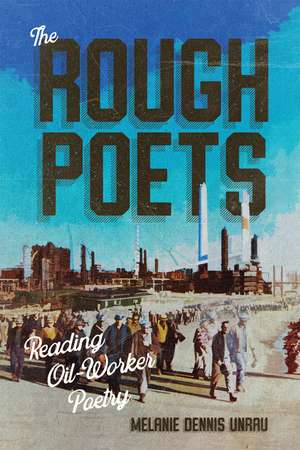The Rough Poets: Reading Oil-Worker Poetry: McGill-Queen's Rural, Wildland, and Resource Studies Series, cartea 18
Autor Melanie Dennis Unrauen Limba Engleză Hardback – oct 2024
Oil workers are often typecast as rough: embodying the toxic masculinity, racism, consumerist excess, and wilful ignorance of the extractive industries and petrostates they work for. But their poetry troubles these assumptions, revealing the fear, confusion, betrayal, and indignation hidden beneath tough personas. The Rough Poets presents poetry by workers in the Canadian oil and gas industry, collecting and closely reading texts published between 1938 and 2019: S.C. Ells’s Northland Trails, Peter Christensen’s Rig Talk, Dymphny Dronyk’s Contrary Infatuations, Mathew Henderson’s The Lease, Naden Parkin’s A Relationship with Truth, Lesley Battler’s Endangered Hydrocarbons, and Lindsay Bird’s Boom Time. These writers are uniquely positioned, Melanie Dennis Unrau argues, both as petropoets who write poetry about oil and as theorists of petropoetics with unique knowledge about how to make and unmake worlds that depend on fossil fuels. Their ambivalent, playful, crude, and honest petropoetry shows that oil workers grieve the environmental and social impacts of their work, worry about climate change and the futures of their communities, and desire jobs and ways of life that are good, safe, and just. How does it feel to be a worker in the oil and gas industry in a climate emergency, facing an energy transition that threatens your way of life? Unrau takes up this question with the respect, care, and imagination necessary to be an environmentalist reader in solidarity with oil workers.
| Toate formatele și edițiile | Preț | Express |
|---|---|---|
| Paperback (1) | 247.13 lei 3-5 săpt. | +25.30 lei 4-10 zile |
| McGill-Queen's University Press – oct 2024 | 247.13 lei 3-5 săpt. | +25.30 lei 4-10 zile |
| Hardback (1) | 643.41 lei 3-5 săpt. | |
| McGill-Queen's University Press – oct 2024 | 643.41 lei 3-5 săpt. |
Preț: 643.41 lei
Preț vechi: 835.59 lei
-23% Nou
Puncte Express: 965
Preț estimativ în valută:
123.13€ • 127.03$ • 104.21£
123.13€ • 127.03$ • 104.21£
Carte disponibilă
Livrare economică 11-25 februarie
Preluare comenzi: 021 569.72.76
Specificații
ISBN-13: 9780228022930
ISBN-10: 0228022932
Pagini: 240
Ilustrații: 16 photos
Dimensiuni: 152 x 229 x 23 mm
Greutate: 0.44 kg
Editura: McGill-Queen's University Press
Colecția McGill-Queen's University Press
Seria McGill-Queen's Rural, Wildland, and Resource Studies Series
ISBN-10: 0228022932
Pagini: 240
Ilustrații: 16 photos
Dimensiuni: 152 x 229 x 23 mm
Greutate: 0.44 kg
Editura: McGill-Queen's University Press
Colecția McGill-Queen's University Press
Seria McGill-Queen's Rural, Wildland, and Resource Studies Series
Recenzii
“A brilliant reflection on the petropoetic logic of extractive, colonial-capitalist industry. For its careful tracing of a distinct tradition of oil-worker poetry and for its acute framing of oil as a substance of contrary infatuation, The Rough Poets is a vital addition to scholarship in Canadian literature and the energy humanities.” Catriona Sandilands, editor of Rising Tides: Reflections for Climate Changing Times
“A long-overdue examination of the art and interior life of a workforce typically passed over for serious consideration. This book adds much to our understanding of industrial workers as fully realized people with a complex relationship to their labour and with a voice that is bigger, if we listen, than the mantras of oil corporations that have historically dominated the discussion.” Kate Beaton, author of Ducks: Two Years in the Oil Sands
Notă biografică
Melanie Dennis Unrau is a Social Sciences and Humanities Research Council Banting postdoctoral fellow in geography and environmental studies at the University of Regina.
Descriere
A rallying cry for climate justice, The Rough Poets introduces the reader to poetry that is ambivalent, playful, crude, and honest, and to oil-worker poets who grieve the environmental and social impacts of their work, worry about climate change and the future of their communities, and desire jobs and ways of life that are good, safe, and just.




